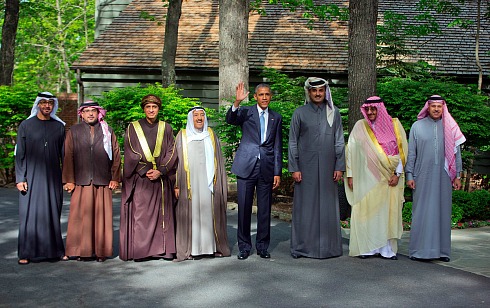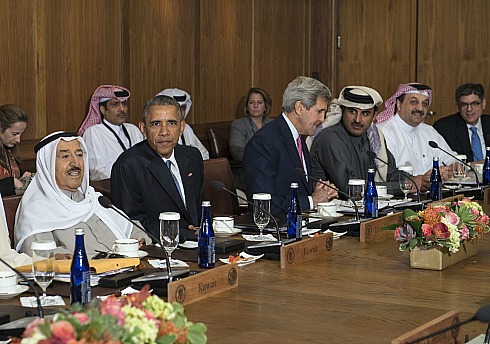Archives
AND MORE...

Kooks With Nukes
_____________________

Falsehoods Galore
_____________________

The Winners
_____________________

Persian Spring
_____________________
May 17, 2015
Obama & The Seven Dwarfs
It seems David Ignatius of The Washington Post could not contain his excitement over President Obama's meeting with Arab leaders of the Gulf Cooperation Council at Camp David on Thursday (see below).
The meeting "ended with surprisingly upbeat statements and an 'unequivocal' U.S. commitment 'to deter and confront' any future aggression from Iran," writes Ignatius.
"The importance of the meeting was symbolic, but that's not a trivial matter. In contrast to Israeli Prime Minister Benjamin Netanyahu, who harangued Obama and lobbied against the Iran nuclear deal from the floor of the Congress, the Gulf Arab leaders have said, in effect, that they'll support the deal so long as Obama keeps Iranian proxies from advancing further in the Sunni world," he gushed.
"For once, in the theater of the Middle East, the Arabs have opted to be the good guys, compared to an unyielding Israeli government. And Obama has responded with the sentiment conveyed by the Arabic expression, 'Ahlan wa Sahlan.' You are welcome."
And they lived happily ever after. Or so it seems from Ignatius' exuberant rant.
EXCEPT the Sunday Times of London reported Sunday that Saudi Arabia has taken the "strategic decision" to acquire "off-the-shelf" atomic weapons from Pakistan.
The Gulf Kingdom, which has financed much of Islamabad's nuclear program over the past three decades, reportedly "comes amid growing anger among Sunni Arab states over" President Obama's deal with Iran. The Saudis think the deal will actually accelerate Iran's nuke push.
So contrary to Ignatius' wishful thinking, this fairy tale will not end with happily ever after but with a nuclear arms race in the Middle East.
American assurances used to mean something, but no one in the world today trusts assurances from an America under Obama.
Washington Post | May 14, 2015
An Upbeat Ending To Obama's Gulf Summit
By David Ignatius

President Obama hosting Arab leaders of the Gulf Cooperation Council (GCC) at Camp David on May 14, 2015. (Pablo Martinez Monsivais/AP)
President Obama’s meeting with Arab leaders of the Gulf Cooperation Council leaders at Camp David ended with surprisingly upbeat statements and an “unequivocal” U.S. commitment “to deter and confront” any future aggression from Iran.
“The U.S-G.C.C. relationship has just been elevated to a new level,” said Yousef Otaiba, the United Arab Emirates’ ambassador to Washington, in a telephone interview after the summit ended. “The potential for collaboration has just taken a new step.”

(Nicholas Kamm/AFP/Getty)
Coming after months of hand-wringing about deteriorating relations with Saudi Arabia, the U.A.E. and other Gulf countries, the Camp David meeting was seen as a potential arena for confrontation. But it apparently proved the opposite. The Arabs got what they wanted, in assurances of American willingness to challenge Iranian meddling in the region, and Obama got an endorsement of his effort to negotiate a nuclear deal with Tehran.
Mutual suspicions will remain—this is the Middle East, after all—but the meeting represented an important consolidation of ties with Sunni Arab powers as the U.S. heads toward a potential breakthrough agreement with Shiite Iran. Obama, in effect, is adopting a strategy of riding two horses at once–an approach Iran, Saudi Arabia and other regional powers have often adopted.
The Camp David setting seems to have helped lighten the atmosphere. After a somewhat stiff morning session devoted to briefing the leaders on the progress of the Iran talks, the leaders adjourned to lunch. After that, the mood changed. During the afternoon, the leaders talked informally about regional challenges in Syria, Iran and Libya, with Saudi, Emirati and Qatari leaders raising their hands to interject and offer comments and suggestions.
The mood in this afternoon session was “really, really positive,” said one attendee. “We came away with a collective spirit we didn’t have before the meeting.”
Secretary of State John Kerry told the group about his visit this week with Russian President Vladimir Putin, and the U.S. hope that the Russians will join in sponsoring a process of political transition away from the regime of President Bashar al-Assad. Obama and other U.S. officials urged Gulf leaders who are funding the opposition to keep control of their clients, so that a post-Assad regime isn’t controlled by extremists from the Islamic State or Al Qaeda.
A joint statement issued by the group took an anti-Assad line, but without the emphatic “Assad must go” tone used by Obama three years ago. This time, the communique “reaffirmed that Assad has no legitimacy and has no role in Syria’s future.” How this change will be accomplished wasn’t explained, and probably hasn’t yet been agreed.
The importance of the meeting was symbolic, but that’s not a trivial matter. In contrast to Israeli Prime Minister Benjamin Netanyahu, who harangued Obama and lobbied against the Iran nuclear deal from the floor of the Congress, the Gulf Arab leaders have said, in effect, that they’ll support the deal so long as Obama keeps Iranian proxies from advancing further in the Sunni world.
For once, in the theater of the Middle East, the Arabs have opted to be the good guys, compared to an unyielding Israeli government. And Obama has responded with the sentiment conveyed by the Arabic expression, “Ahlan wa Sahlan.” You are welcome.
Original article here.
Log In »
Notable Quotables
"Mr. Netanyahu is one of the most media-savvy politicians on the planet. On Friday he appeared live via video link on 'Real Time with Bill Maher,' taking the host’s alternately sardonic and serious line of questioning with gazelle-like alacrity."
~ Anthony Grant, jourrnalist who has written for many major newspapers and worked in television at Paris and Tel Aviv, interviewing former PM Benjamin Netanyahu on Monday, at the outset of Mr. Netanyahu's new book (more here).


